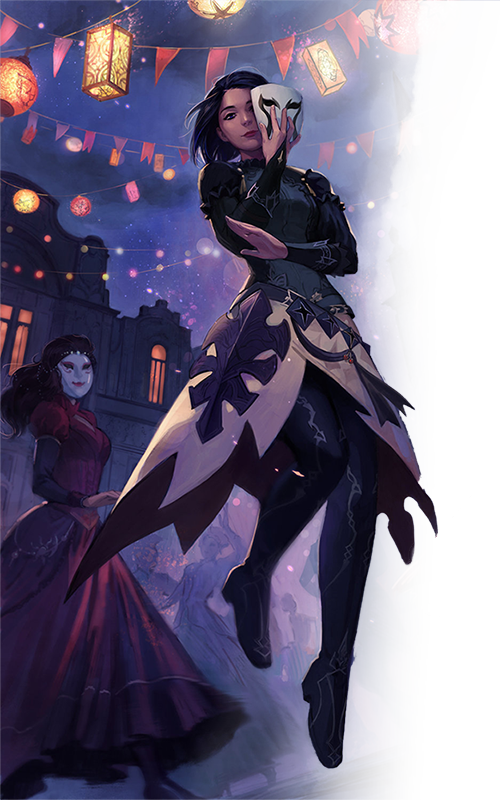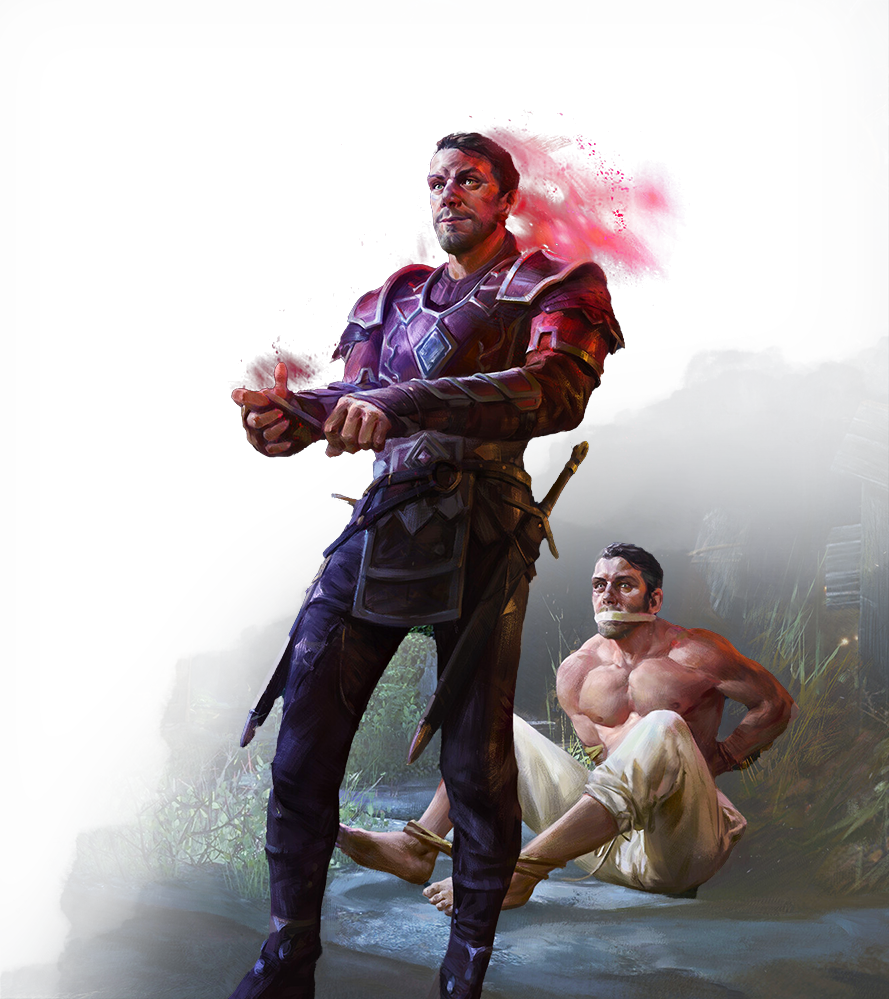
Rogue: The Masquerader
It is wrong to judge by appearances. Despite his expression, which was that of a piglet having a bright idea, and his mode of speech, which might put you in mind of a small, breathless, neurotic but ridiculously expensive dog, Mr Horsefry might well have been a kind, generous and pious man.
You are a cunning social manipulator. Your focus is on people, your outward appearance, and the art of misdirection.
Due to their mastery of social dynamics, masqueraders often live double lives as charlatans, performers, socialites, and spies, and as a result are very frequently employed by influential figures to infiltrate their rivals without notice. Deception is the tool of the trade for masqueraders as they rely on disguises and underhanded tricks to mask their true intentions.
Generally, a masquerader will craft a set of false identities for themselves that lets them transform into an entirely different person at a moment's notice. A masquerader's true identity is one of their best kept secrets.
Masquerader Features
| Level | Feature |
|---|---|
| 3rd | Mask of the Impostor, Deceptive Fighting |
| 9th | Gentle Twist |
| 13th | It Could Be You |
| 17th | A Face You Can Forget |
Masquerader saveDC
The following save DC is used for many of your Masquerader features.
Masquerader saveDC = 8 + your proficiency bonus + your Charisma modifier
Mask of the Impostor
3rd level Masquerader feature
You are proficient with disguise kits, and your proficiency bonus is doubled for any ability check that uses your proficiency with disguise kits. You gain a disguise kit if you don't have one already.
With ten minutes of work, you can use your disguise kit to make yourself look like an entirely different person. You can alter your clothing, change your physical appearance (including perceived race or gender), and make yourself appear up to one foot taller or shorter, but you cannot change your basic form. To discern that you are disguised, a creature can use its action to inspect your appearance and must succeed on an Intelligence (Investigation) check against your Masquerader saveDC.
Deceptive Fighting
3rd level Masquerader feature
You gain an additional way to use your cunning action: to mislead a creature in the heat of battle. For instance, you may fake an injury to escape a hostile situation or form a distraction that opens your target to your attack.
As a bonus action, you target a creature that is within 30 feet of you and make a Charisma (Deception) check contested by the target's Wisdom (Insight) check. You automatically succeed on this check if the target is charmed by you. If you succeed, the target is unable to react to your movement or actions and suffers disadvantage on attack rolls against you, with both of these effects lasting until the start of your next turn. You also gain advantage on your next attack against the target made before then.

Streamlining Deceptive Fighting
This variant ruling offers a way for DMs to streamline combat that involves a masquerader.
Before combat starts, note down each combatant's passive Insight (see PHB pg.175 on how to calculate passive checks). When the masquerader uses their Deceptive Fighting feature, their Charisma (Deception) check is made against the target's passive Insight, rather than rolling for the target.
Gentle Twist
9th level Masquerader feature
You can attempt to charm a non-hostile creature by interacting with it for at least one minute. At the end of your interaction, the target must succeed on a Wisdom saving throw against your Masquerader saveDC or be charmed for one hour. A creature with an Intelligence score of 4 or less is immune to this effect.
The charmed creature trusts you as it would a close friend. It believes anything you tell it and carries out basic tasks for you, but will avoid violence unless it was already inclined to fight on your behalf. The false trust you create also opens up the creature to your attack. If you hit the charmed creature with a weapon attack, you can end the charm effect on it to deal maximum damage, instead of rolling.
The charm ends early if you or your companions to anything harmful to the creature or to one of its allies. When the effect ends, or if the target succeeds on its save, the target knows it was charmed by you and becomes immune to your use of this feature for 24 hours.
It Could Be You
13th level Masquerader feature
By incorporating materials taken from another person into your disguise, such as by using tufts of their hair or by wearing their clothing, you form a disguise that is so perfect it even fools magic.
Until you change your appearance, other creatures automatically believe you to be the original person until given an obvious reason not to, and any check made to discern that you are disguised is made with disadvantage. Spells and other magical effects also treat you as they would the original person, and even believe you to be of that creature's type. For example, while disguised as a wizard and wearing their robes you can freely open any arcane lock they created.
A Face You Can Forget
17th level Masquerader feature
Your beguiling words can even alter a creature's recollection of its most recent events. When a target stops being charmed by you, it must succeed on a Wisdom saving throw against your Masquerader saveDC. On a failed save, you can select one or both of the following effects.
Subtle Charm. You alter the target's understanding so it remains unaware that it was ever charmed or manipulated in any way.
False Narrative. If the target can hear you, you provide it with a false but logical narrative of anything it witnessed within the last 10 minutes. The target believes your narrative to be unquestionably true, and its mind fills in any gaps or inconsistencies in your description to the best of its ability. For instance, you can convince a target that an injury it sustained was somehow inflicted by a different creature. The only way to restore the target's original memories is through a greater restoration spell or more powerful magic.
If a creature succeeds on this saving throw, you can't use this feature on it again for 1d4 days.
Credits
Art Credits
Julia Zhuravleva — Carnival
Grafit Studio — Doppleganger
Version 4.1